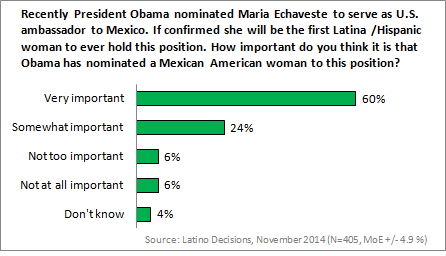Not surprisingly, large proportions of American Latinos are attuned to major news from south of the border. This focus contributes to their pronounced views on specific issues in U.S. relations with Latin America. A prime example is the importance that a great majority of Latino voters attach to President Obama’s nomination of Maria Echaveste of California to be the next U.S. Ambassador to Mexico.
Last September the White House announced that the President would nominate Echaveste, a prominent Latino rights legal advocate, as the next United States ambassador to Mexico. Once a corporate lawyer, Echaveste went to work for the federal government in the 1990s, first in the Department of Labor, and later in the West Wing as Deputy Chief of Staff to President Bill Clinton. She is the first woman ever nominated for this position, and if confirmed, would be the first Latina to head our embassy in Mexico City — one of the largest American diplomatic missions in the world.
In November 2014, a Latino Decisions poll of the Latino electorate found 84% of Latino voters consider it either very (60%) or somewhat (24%) important that Obama nominated a Mexican American woman to take this key diplomatic post.

This response is particularly notable as the survey included only Latino registered voters hence, American citizens. Moreover, 42% of those interviewed trace their Latino heritage to countries other than Mexico. To give some context to the Echaveste response: in 2012, Latino Decisions found only 43% of naturalized Mexican American voters indicated they were following the Mexican presidential election. Indeed, the share of Latino voters who consider the Echaveste nomination important exceeds the share (59%) that rely on Spanish-language television for their political information. At 84%, the share of Latino voters who call the Echaveste nomination important reaches up into the range of those who support President Obama’s executive action on immigration. The recent Latino Decisions poll commissioned by Presente.org, in partnership with NALAAC and Mi Familia Vota, found that 89% of Latino registered voters support the President’s action either strongly (68%) or somewhat (21%).
A major difference between Obama’s executive action on immigration and his nomination of Echaveste as ambassador is that the latter cannot take effect without confirmation by the U.S. Senate. Last year the Senate Foreign Relations Committee failed to even schedule a hearing on her nomination (along with many others that were left pending). For this reason, the Administration had to resubmit Echaveste’s nomination to the (new) Senate for confirmation.
Direct attachments to Mexico and Spanish-language news consumption alone do not fully account for Latino enthusiasm for Echaveste’s nomination. Taken together, the evidence reviewed here suggests that the Latino electorate views her nomination as a community political issue. It is evident that the White House has a basis for pressing the Senate to schedule a hearing and vote on Maria Echaveste’s ambassadorial nomination, not only due to the importance of U.S.-Mexico relations and the complexity of the situation in that country, as well as her substantial qualifications and preparation for this position, but also because a particularly informed constituency of American citizen voters appreciates the significance of this historic nomination.
David R. Ayón is Senior Strategist and Advisor at Latino Decisions. He is also a Senior Fellow at the Center for the Study of Los Angeles at Loyola Marymount University, a member of the Council on Foreign Relations, and a director of the U.S.-Mexico Foundation.


